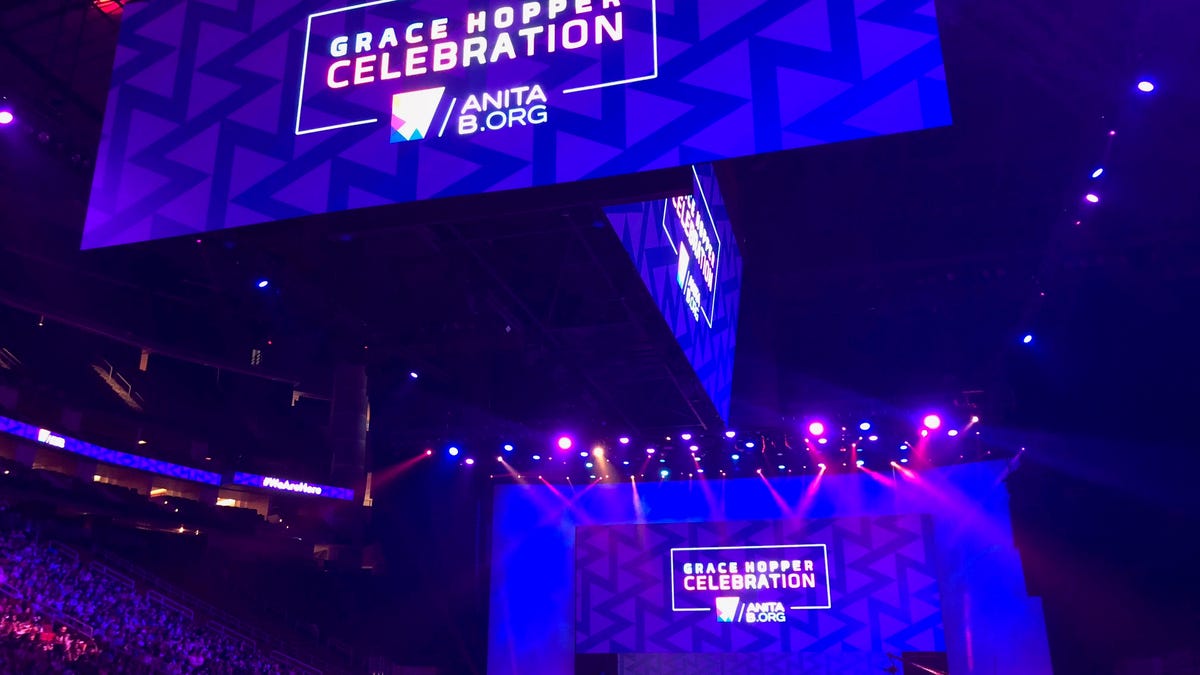Grace Hopper confab offers optimism amid #MeToo, Supreme Court hearings
The annual Grace Hopper Celebration of women in computing coincided with a contentious round of Senate hearings over sexual assault accusations.

The Grace Hopper Celebration attracted more than 20,000 attendees.
Across the country this week, people turned toward their screens. They checked their phones and huddled around their TVs to get the latest on the testimony of a woman who came forward to accuse a Supreme Court nominee of sexual assault -- the latest development in the #MeToo movement -- and to watch that nominee defend himself.
But at the Grace Hopper Celebration, a conference for women in computing, attendees maintained focus on the event and its mission: doing the nitty-gritty work that eventually shifts a culture toward equality, while staying optimistic in the face of adversity.
Over the course of three days in Houston, attendees, who mostly range from students to women at midcareer, listened to speakers on everything from asking for a raise to overcoming imposter syndrome to dealing with the latest on purely technical topics, like cloud infrastructure or databases.
Conference-goers hit the expo floor, talking to recruiters about the jobs they want. They walked through a gallery of influential women in the industry and picked up posters celebrating the likes of computing icon Ada Lovelace.
The event's goal of making tech a space that welcomes women and minorities has a particular resonance this year following the rise of the #MeToo movement, which has already toppled prominent figures in media, entertainment and politics. The Grace Hopper Celebration wants its attendees to know they're not alone and they're not without power.
#MeToo comes to Grace Hopper
GHC started in 1994 and has grown into an annual event that attracts more than 20,000 visitors. Companies send flocks of employees to attend sessions and get a reprieve from maybe being the only woman in the room. What's more, the conference underlines the idea that even the voice of one person can make an impact for those who come next -- the theme of the #MeToo era.
When Anita Hill walked out on stage at GHC on Friday morning, the room of mostly women technologists rose to applaud.
Hill had been slated for a few months to speak about the past and the present of the #MeToo movement. But the significance of her session shifted dramatically. She addressed the crowd at almost the same time as the Senate Judiciary Committee, some 1,500 miles away in Washington, convened to discuss what to do about Supreme Court nominee Brett Kavanaugh, a day after Christine Blasey Ford testified that he'd sexually assaulted her during their high school days.
The Kavanaugh situation was an eerie echo of the 1991 hearing in which Hill accused Supreme Court nominee (and now Justice) Clarence Thomas of sexually harassing her. (Both Thomas and Kavanaugh denied the allegations brought against them.)
"I would be surprised if he didn't get confirmed," Hill said of Kavanaugh, sending a ripple through the room.
In some of GHC's smaller sessions, #MeToo was a subject of discussion as well. In one Friday session, employees from Atlassian and Salesforce spoke about striving to have "uncomfortable" conversations at work that can lead to creating the type of environment where women can speak up without fear.
Shannon Winter, one of the presenters of the workshop, had told me earlier about her experience starting a women's group at her office and wanting to spur other companies to do the same.
The group "let us team up for these open, often uncomfortable conversations about topics we otherwise would not have discussed, especially during such a pivotal time for women with the #MeToo movement and all this stuff that was coming out," Winter said the week before the conference.
In another session, Anjana Rajan, chief technology officer of a company called Callisto, spoke about creating software to document sexual harassment and assault and potentially help victims come forward if they choose to.
Staying positive
Friday morning, when SpaceX President and COO Gwynne Shotwell came out on stage, she looked around at the crowd and commented, "Hopefully today will take your mind off things going on in the news."
GHC deals in optimism. It's a rally for women in an industry frequently cited as being everything from unaccommodating to flat-out hostile toward them. Speakers talk about the change coming to the industry as a certainty.
Pop music by female artists blares. Cupcakes are bountiful on the expo floor. There's a dance party on the final evening. Capital One offered the chance to write messages on colorful square cards to middle schoolers, like, "You belong here" and "Don't let others intimidate you." On a chalkboard, attendees wrote their vision for the future of women in tech: inclusion, parity, the ability to speak up.
Whether the Kavanaugh hearings dominated conversation at Grace Hopper or not, one message was clear.
During Hill's session, she took a few questions. Someone asked, "What would you say to a women who feels like her voice does not matter?"
Hill replied, "It does."
Solving for XX: The tech industry seeks to overcome outdated ideas about "women in tech."
Taking It to Extremes: Mix insane situations -- erupting volcanoes, nuclear meltdowns, 30-foot waves -- with everyday tech. Here's what happens.

